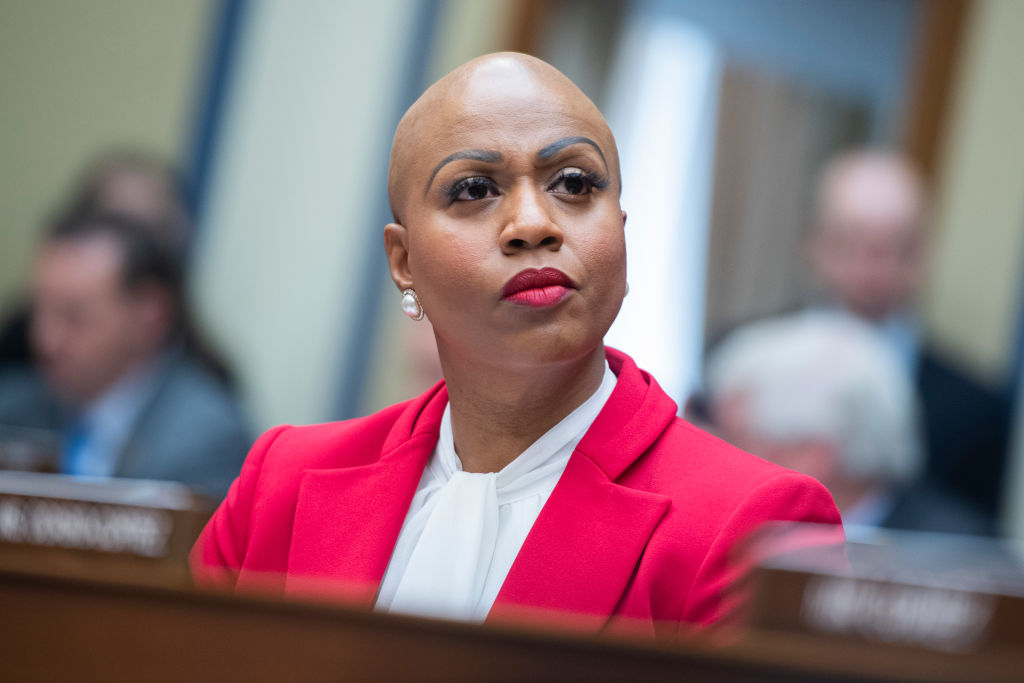
Source: Tom Williams / Getty
Rep. Ayanna Pressley is continuing to fight for marginalized communities during the coronavirus pandemic, and most recently she called out Massachusetts Gov. Charlie Baker for a set of guidelines released by his administration last week.
According to Boston.com, Pressley is calling on Baker to rescind voluntary state crisis care standards that Pressley says are unfair to people of color and people with disabilities.
The standards are recommendations on how to ration medical equipment like ventilators and intensive care units if the number of critically ill patients outnumbers the supply. The standards explicitly say that characteristics like race, gender and disabilities shouldn’t play a role in those “tragically difficult” decisions.
However, in a letter sent to Baker, Pressley outlines how the standards would “exacerbate existing health disparities and disproportionately impact communities of color and individuals with disabilities” in ways that are overlooked.
The current standards use a point system to score and prioritize patients based on “saving the most lives” and “saving the most life-years.” In other words, the healthier, younger people would generally be given preference.
The second part of the system is measured on the presence of “life-limiting” co-morbidities, which refers to patients who have a preexisting condition or disease that could limit their long-term life expectancy. Patients are given up to four points based on the severity of the condition, and they’re also assigned between one and four points based on their prognosis for short-term survival. These two scores are then added up and the patients with the lowest cumulative score will get priority when receiving medical necessities.
“Patients who are more likely to survive with intensive care are prioritized over patients who are less likely to survive with intensive care,” the guidelines read. “Patients who do not have serious comorbid illness are given priority over those who have illnesses that limit their life expectancy.”
Pressley, a Democrat who represents Massachusetts’ seventh congressional district, expressed in her letter that the guidelines disadvantage people of color who are more like to have co-morbid conditions such as asthma, diabetes, and hypertension that increase the risk of COVID-19 hospitalization or death. “In the event our healthcare system becomes overwhelmed and resources must be rationed, the MADPH Current Crisis Standards of Care make it so that these populations are far less likely to receive life-saving medical care,” Pressley’s letter read.
She also explained how years of institutional racism have contributed to the current situation for Black people.
“The legacy of structural racism and inequality has resulted in unequal access to affordable health care, safe and stable housing, and quality schools and employment,” she wrote. “Like the H1N1 pandemic before it, COVID-19 has already robbed us of thousands of lives, many of whom are people of color. In the midst of this crisis, social and economic inequality has simply worsened these disparities and exposed severe cracks in our nation’s safety net.”
Preliminary data on COVID-19 released by the Baker administration (along with data in the city of Boston) suggest that Blacks and Latinx people had disproportionately higher rates of coronavirus infection. Pressley praised the state for collecting the data, but said it was “only as good as the policy it informs.”
“We must use it to prevent even worse outcomes from taking hold in our most vulnerable communities,” she wrote. “It is for this reason that I strongly urge you to rescind the MADPH Current Crisis Standard of Care guidelines.”
Pressley also said that the current guidelines threaten people with disabilities. She said that under typical standards the disability community already faces major challenges navigating access to healthcare. “But perhaps the most persistent and harrowing concern shared across the disability community, is the dire concern that because of the MADPH Current Crisis Standards of Care guidelines, individuals with disabilities could be denied or deprioritized access to care because of their disability.”
In response to Ayanna’s concerns and other Boston politicians’ concerns, the Health and Human Services Secretary Marylou Sudders — who is leading the state’s coronavirus response — said that the guidelines are voluntary and some Massachusetts hospitals have already enacted their own standards.
Despite the intentions of the guidelines, Sudders did acknowledge that people of color and people with disabilities are more likely to have preexisting conditions and thus, more vulnerable to the coronavirus.
“We must work to mitigate these longstanding institutional barriers, in order to improve equitable access to care and treatment,” Sudders said.
Sudders added that hopefully facilities won’t have to utilize the guidelines, considering recent efforts to obtain more ventilators and to build hospital bed capacity in Massachusetts. “We’ve been planning, and continue to plan, for the worst scenario, with the fervent hope that these guidelines are never used,” Sudders said.
SEE ALSO:
Will Obama’s Endorsement Of Biden Unite ‘Bernie Bros’ Around Democrats To Defeat Trump?
















